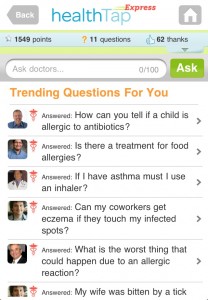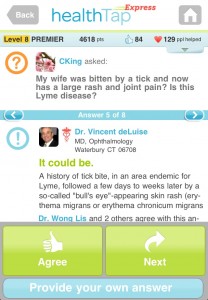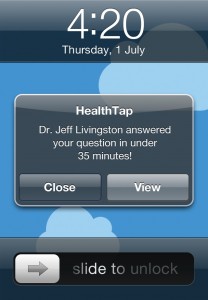 About 80 percent of US adults go online to look up health information, according to Pew, but very little, if any, of the information they read online comes from their own personal physicians. HealthTap plans to change that, the startup's CEO Ron Gutman told MobiHealthNews in an interview last week.
About 80 percent of US adults go online to look up health information, according to Pew, but very little, if any, of the information they read online comes from their own personal physicians. HealthTap plans to change that, the startup's CEO Ron Gutman told MobiHealthNews in an interview last week.
HealthTap announced this week the launch of two new free mobile apps, called HealthTap Express -- one for patients and one for physicians. The apps are now available for iPhone and Android users.
HealthTap's initial offering is a question and answer platform that helps users find health information written by local physicians -- both online and through the mobile apps. The company currently has more than 5,000 physicians signed up for "virtual practices." Gutman said most of them found out about HealthTap from other physicians: "We launched our public beta about 20 weeks ago with 500 physicians, and we have grown it tenfold since then. The one thing we weren't sure we could do was attract enough physicians to interact with patients online, which was never done before."
Gutman argues that physicians will use the platform to give patients anytime, anywhere access to those frequently asked questions that come up during most patient visits. By making those answers available to current and prospective patients in the cloud, physicians can spend more time with patients on providing care rather than answering their standard FAQ in-person. Since physicians are so crunched for time -- Gutman said the typical patient-physician visit is between 8 minutes and 11 minutes now -- saving time by making the FAQ available elsewhere could mean a greater number of visits for physicians or more time to focus on less frequently asked questions.
"These same tips and questions are also visible by search engines and shareable through social media so all of a sudden patients especially local patients can find answers from these physicians rather than go to a website and find information from who knows who," Gutman said. "Then they can make an appointment with that physician who answered their question because there is no longer this divide between finding information on the Internet and going to the doctor."
 Gutman says that the virtual practice will help physicians provide better care for existing patients while attracting new patients to their practice. A recently added feature for HealthTap's physician users is the "I Agree" button, which lets physicians find answers already submitted by other doctors using the platform and adopt that answer as their own, with kudos to the original MD.
Gutman says that the virtual practice will help physicians provide better care for existing patients while attracting new patients to their practice. A recently added feature for HealthTap's physician users is the "I Agree" button, which lets physicians find answers already submitted by other doctors using the platform and adopt that answer as their own, with kudos to the original MD.
"It's great for physicians because they get content for free and the original writer gets a kudos and more exposure," Gutman said. "When a patient comes in and can see which answer gets the most agrees by physicians, that makes that physician look good, too. This is the first time on the Internet that physicians are ranking other physicians by quality."
Gutman says with the mobile apps making appointments through HealthTap just got a lot easier since the physician's virtual practice page includes their phone number. Smartphones make phone numbers into click-to-call links, so appointment booking is only "one click away," according to Gutman.
"We don't charge for it -- neither the patient nor physician is charged. We don't have appointment booking software yet, but our mission is to help patients lead happier, healthier lives -- not to improve the bureaucracy of the healthcare system," Gutman said. "Are there some efficiencies that are more bureaucratic that we couple improve? Sure. That's just not our focus right now."
Last year Jeff Arnold, founder of WebMD launched his own question and answer platform called ShareCare, which seemed to have a number of similarities to Gutman's HealthTap. One major difference, according to Gutman, is that while Sharecare has answers from individual physicians and well-known healthcare facilities it also works with partners including sponsors like Colgate-PalmOlive, Unilever, and Walgreen to answer questions.
 "We are not and will never allow brands to answer health questions, which is very key to what Sharecare is doing," Gutman said. "We are not going to allow a soap company to answer health questions. We believe that trust is a very important key. We are working with physicians around the country and already have (by orders of magnitude) more doctors than any other. We don't partner with facilities and healthcare facilities or charge them money. It is completely open. There also isn't an advertising model, because that would ruin the user experience."
"We are not and will never allow brands to answer health questions, which is very key to what Sharecare is doing," Gutman said. "We are not going to allow a soap company to answer health questions. We believe that trust is a very important key. We are working with physicians around the country and already have (by orders of magnitude) more doctors than any other. We don't partner with facilities and healthcare facilities or charge them money. It is completely open. There also isn't an advertising model, because that would ruin the user experience."
Gutman says HealthTap has no plans for an advertising or sponsorship business model. "Answers need to come from trusted, US-licensed, physicians under their name, picture, medical license," he said. "They are doing it because they care about the patients, not because the are trying to make a buck selling soap."
So how will HealthTap stay in business?
"We have a big privilege," Gutman said. "We have a great set of investors who themselves have been very instrumental in transforming industries and we are lucky that they have given us a mandate to focus on product and distribution right now. Having said that, and not to avoid your question, where we are going to go with our business model is really deep into the process of care: If we can bring physicians and people together and bring some of their interactions into the virtual world then we think we can capture some of that $480 billion spent in the physician-patient visit industry."
Gutman says that the "clunky" business of in-person doctor visits was created to reflect our lifestyles 200 or 300 years ago. Today we are online, using social media, playing games. We need to use these tools to make interactions with physicians more convenient and effective, too, he argues.
"Health is not going to be solved online," Gutman cautioned. "It's not going to be solved on a mobile device either. It's going to start there, though. Patients still need to connect to a physician, that's not going to go away. What's missing, what no one has been able to achieve in health yet is a meaningful consumer engagement or a meaningful doctor engagement process for care."


















